Day 7: What’s Possible When We Prioritize Collective Care
Introduction:
Care is often dismissed as "soft" or "optional" in a culture that prizes productivity and individual success above all else. But what if care was the foundation for liberation? In today’s session, we explored how prioritizing collective care challenges supremacy culture, builds trust, and redefines success as something we achieve together. Care isn’t just an act of kindness—it’s a revolutionary practice that sustains communities and creates systems rooted in equity and justice.
Key Takeaways:
Collective Care is a Revolutionary Act:
Supremacy culture conditions us to view care as weakness, but centering collective care actively disrupts systems of oppression and prioritizes humanity, equity, and sustainability.The Ripple Effect of Care in Community Spaces:
When care is prioritized, it creates a foundation of trust, accountability, and safety, allowing individuals to show up authentically. This ripple effect strengthens relationships and fosters collective liberation.Redefining Success Through Collective Care:
Supremacy culture ties success to individual accumulation and competition. Collective care redefines success as shared well-being, ensuring no one is left behind.
Highlights from the Conversation:
Collective Care as a Revolutionary Act
We began by redefining care as a radical act that challenges the values of supremacy culture. Supremacy culture prioritizes profit, competition, and productivity, often at the expense of humanity. Collective care flips that script, centering well-being and sustainability over exploitation. For example, mutual aid networks provide tangible examples of how care-based systems can operate outside of traditional power structures, redistributing resources equitably and addressing unmet needs.
The Ripple Effect of Care
Care doesn’t just sustain individuals—it transforms communities. We discussed how prioritizing care builds trust and strengthens bonds, creating spaces where people feel safe to show up authentically. This ripple effect is evident in intentional communities that share responsibilities like childcare, conflict resolution, and resource distribution. These practices foster trust and show how care-centered systems can disrupt hierarchies and amplify equity.
Redefining Success Together
Finally, we explored how collective care redefines success. Supremacy culture teaches us that success is individual and tied to wealth or hierarchy, but liberation calls us to imagine success as shared abundance. Indigenous practices, such as collective farming or resource sharing, remind us that when care is the foundation, communities thrive together. Success becomes a measure of collective well-being, not individual accumulation.
Reflection Points:
How do you define success in your personal life and community? How does that align with—or challenge—the values of supremacy culture?
Where can you prioritize care in your life or relationships to strengthen trust and equity?
What does care-centered accountability look like in your community spaces?
Journal Prompts:
Reflect on a time when care created safety or trust in your life. What did that feel like?
How does the way you view success impact your ability to prioritize care for yourself or others?
What small act of care can you offer to someone in your community this week?
Actionable Steps:
Start Small: Practice one act of care today—whether for yourself or someone in your community.
Explore Tools for Equity: Learn more about community-centered care through
Theory of Indivisibility podcast.Dive Deeper: Grab my ebook, Dismantling Supremacy Culture: Understanding and Overcoming Its 15 Pillars, to better understand how care disrupts systems of oppression. It’s Pay What You Can: Download it here.
Practice Your Praxis: Reach out to someone and state a need—no matter how big or small. Allow people to show up to their capacity, and embrace the reciprocity of care.
Looking Ahead: Day 8 Preview
Tomorrow, we’ll discuss The Role of Ancestral Wisdom in Building Community. How can we draw from the knowledge and practices of our ancestors to heal disconnection and create systems of care? Join me at 9:30 AM EST for this transformative session.
Reminder
The first 10 days of 100 Days of Community are free, but after that, access will transition to paid subscribers. Right now, you can get 20% off the annual subscription ($80).
If financial barriers exist, please email scholarships@desireebstephens.com for a comped subscription.
In solidarity and liberation,
Desireé B. Stephens CPS-P
Educator | Counselor | Community Builder
Founder, Make Shi(f)t Happen
Join me tomorrow at 9:30 am EST for my next live video in the app




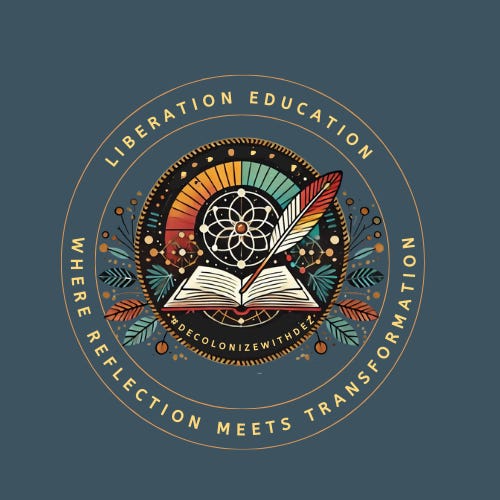

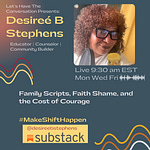


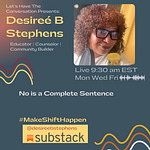


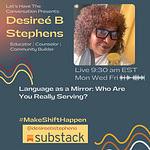
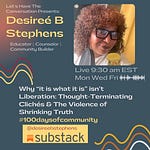
Share this post